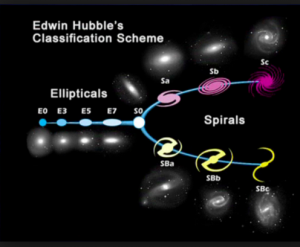The Universe
Objectives
Sequence the events of the Big Bang Theory
- The universe began as a small, dense sphere
- It began to expand
- It is still expanding today at an ever increasing rate
Describe the Big Bang Theory
Know 3 pieces of evidence supporting the Big Bang Theory
- Cosmic background radiation (remember the unexplainable “heat” from the video)
- Doppler red shifts of neighboring galaxies
- Quasars Quasistellar Radio Sources (meaning “star-like radio sources”)
Quasars were once thought to be nearby stars but had unusual optical spectra.It was later found that the “stars” were not as close as previously believed and the large Doppler shift indicated they were moving at a fraction of the speed of light
Quasars are not stars but object emitting radiowaves
Interesting video:
Activities
Lab: Our expanding universe
Activity: Hubble’s Law worksheet
Conclusion questions:
1. Study the velocity of the galaxy closest to Earth to that of the galaxy . How do the velocities compare? What can you infer about the expansion of the galaxy?
2. The Milky Way galaxy shows a velocity of 0 km/sec. Does that mean our galaxy is the center of the universe and all expansion occurs from the Milky Way? Explain.

